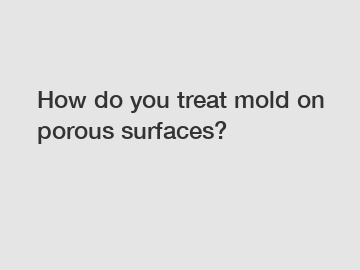How do you treat mold on porous surfaces?
How to Remove Mold from Porous Surfaces.
Porous materials such as wood, fabric, and drywall are particularly susceptible to mold growth. When excess moisture is present, mold can thrive and spread rapidly on these surfaces, which can be challenging to clean and remove. Promptly addressing mold on porous surfaces is crucial to prevent further damage and potential health risks. In this article, we will discuss effective methods to treat mold on porous surfaces and protect your property from the harmful effects of mold growth.
Identifying the Presence of Mold.

Before tackling mold on porous surfaces, it is essential to identify whether you are indeed dealing with mold. Mold often appears as dark spots or patches on surfaces, accompanied by a musty smell. If you are unsure whether the substance is mold, consider consulting a professional mold inspector or conducting a mold testing kit.
Secondary Heading: Prevention is the Best Cure.
One of the most effective ways to treat mold on porous surfaces is prevention. By controlling moisture, you can greatly reduce the risk of mold growth. Here are some preventive measures you can take:
1. Keep your indoor humidity levels low. Ideally, maintain humidity levels below 60%. Consider using a dehumidifier in areas prone to excessive moisture, such as basements or bathrooms.
2. Ensure proper ventilation in your home. Use exhaust fans while cooking and showering, and open windows when weather permits.
3. Fix any plumbing leaks or water intrusion issues immediately. Mold thrives in damp environments, so addressing water problems promptly is crucial.
Secondary Heading: Steps to Treat Mold on Porous Surfaces.
If you have identified mold on a porous surface, it is essential to take immediate action to prevent further damage. Here is a step-by-step guide to treating mold on porous surfaces effectively:
1. Protect yourself: Before starting the cleaning process, ensure you are wearing protective gear such as gloves, goggles, and a mask to avoid inhalation of mold spores.
2. Contain the area: Use plastic sheets or tarps to isolate the affected area from the rest of the space. This will prevent the spread of mold spores to other parts of your home.
3. Remove mold-infested materials: Porous materials heavily infested with mold, such as upholstered furniture or severely damaged drywall, may need to be discarded. It is challenging to completely remove mold from these materials and prevent future growth.
4. Clean non-porous surfaces: For non-porous materials such as glass or tile, mold can be removed using soap and water or a mixture of bleach and water. Scrub the surface thoroughly and ensure it is completely dry to inhibit future mold growth.
Secondary Heading: Seeking Professional Help.
Mold remediation can be a complex process, especially when dealing with mold on porous surfaces. If the affected area is large, the mold growth is widespread, or you are unsure about your ability to effectively remove the mold, it is advisable to contact a professional mold remediation company. These experts have specialized equipment and techniques to handle mold infestations effectively and ensure the safety of your property.
Closing Paragraph:
In conclusion, promptly treating mold on porous surfaces is crucial to prevent further damage and potential health risks. By implementing preventive measures, such as controlling moisture and ensuring proper ventilation, you can minimize the likelihood of mold growth. Should you encounter mold on porous surfaces, following the appropriate steps to remove and clean the affected areas is essential. However, if the situation seems overwhelming or the mold infestation is extensive, it is recommended to seek professional assistance. Remember, mold remediation is best left in the hands of experts to ensure a safe and effective treatment. If you require professional help or have any further questions, please do not hesitate to contact us.
Contact us to discuss your requirements of china gas sparger, porus metal, sintered stainless steel filter disc factory. Our experienced sales team can help you identify the options that best suit your needs.

Comments